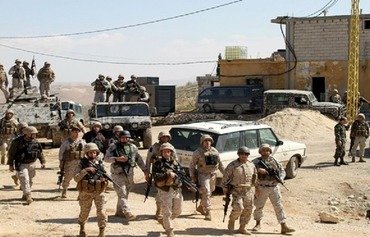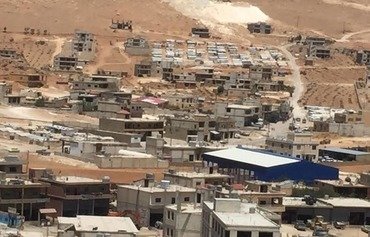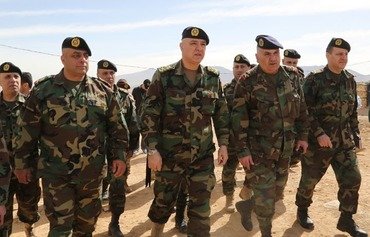In the span of one week, two "Islamic State of Iraq and the Levant" (ISIL) officials were found dead in the Lebanese border town of Arsal in what experts tell Al-Mashareq is a renewal of the war of attrition between rival jihadist groups.
On February 7th, ISIL's "sharia court" official in al-Qalamoun was found dead in his vehicle, killed by an improvised explosive device (IED), local media reported.
He was identified as Ahmed Waheed al-Abed, a Syrian from the town of al-Jarajir who is widely known as Abu al-Baraa.
The corpse of Syrian ISIL operative Ahed al-Jawash, who goes by the name Abu Adham al-Hamawi, was found bearing gunshot wounds on February 15th.
Lebanon's National News Agency reported that three gunmen on a motorcycle had opened fire on him in Arsal's al-Sabeel square, killing him instantly.
Ongoing power struggle
Some believe the latest killings are a continuation of the power struggle between ISIL and al-Nusra Front (ANF), now calling itself Fatah al-Sham Front, over the extension of control in the area.
In October, ISIL operative Abu Bakr al-Raqawi was found dead with gunshot wounds in al-Jabban area near Arsal's Wadi Hmeid.
Intelligence revealed that days before al-Raqawi was killed, Mustafa al-Hujairi, also known as Abu Taqiyeh, had met with ANF elements and asked them to develop a plan to eliminate ISIL and its leaders in Arsal.
Abu Taqiyeh, a fugitive known to be affiliated with ANF, has been indicted by the Lebanese authorities for his involvement in the kidnapping of Lebanese soldiers in August 2014.
The recent slayings and others in 2016 are part of the "liquidations taking place in the ranks of ISIL itself and between ISIL and ANF", said Michel Nasrallah, a journalist specialising in terror groups who writes for Addiyar newspaper.
"Information has become available to the intelligence directorate indicating that Mustafa al-Hujairi had reached an agreement with ANF to liquidate ISIL in Arsal and its barren areas and inside displacement camps," he told Al-Mashareq.
"Aside from this agreement, a conflict is ongoing between ISIL and ANF that initially began as an ideological clash and evolved into a clash over theft and the kidnapping of the soldiers," he said.
Each group is vying to extend its control over Arsal and its outskirts, he added.
Heightened tensions
The slaying of the two ISIL officials is evidence of the "strong animosity between ISIL and ANF", said military expert Brig. Gen. Khalil Helou, a retired Lebanese army officer.
Tensions between the two groups have been heightened since the battle of Aleppo and the clashes that took place in Idlib province, he told Al-Mashareq.
"The events in Syria are carrying over to Arsal as manifested by the conflict between ISIL and ANF, especially after the Lebanese army, through its many regiments, tightened its control over the Lebanese-Syrian land border," he said.
The war of attrition between the two groups began in June 2016, when each tried to control vital routes and secure access to Arsal to obtain food, impose tributes on residents and establish itself as the regional authority, he said.
Clashes around Arsal have "taken a bloodier turn including liquidations, assassinations and kidnappings, with ANF recently killing three ISIL elements after kidnapping them", he added.
While the reasons for these killings vary, controlling a "vital lifeline between the barren areas and Arsal remains the primary goal", Helou said.
"The conflict between ISIL and ANF in Syria is longstanding and will continue to impact Arsal and its environs," he added.
The final objective is to "control the region and secure paths for the procurement of food supplies from Arsal and weapons from Syria via the Damascus-Homs road to al-Qalamoun's outskirts," he said.
Relief among residents
Any liquidation between the two groups "relieves the town of their evil and their attacks on the people of Arsal", Arsal mayor Bassel al-Hujairi told Al-Mashareq.
"Their presence poses a threat to Arsal and Lebanon," he said.
ISIL operatives have "tarnished the town’s reputation and we stand openly against them", he said. "The municipality is confronting them with its guards and municipal police and co-operating with the army and all the security agencies."
Arsal, with a population of about 30,000, is currently hosting more than 100,000 Syrian refugees, most of whom live in camps on its outskirts.
"ISIL and ANF elements try to infiltrate these camps and often are ambushed by the army," al-Hujairi said. "Meanwhile, they also are killing each other."
The presence of extremists in Arsal "is putting pressure on our security and development, because we cannot access the sources of our livelihood, namely our lands and quarries", he said.
"We consider every militant an enemy, and the danger lies in their aggressive mentality and brutal behaviour among us. So, the death of any of them comes as a relief to us."

!['Islamic State of Iraq and the Levant' and al-Nusra Front fighters are seen during clashes in Arsal last fall, which prompted heavy artillery fire from the Lebanese army. [Photo courtesy of the Lebanese army guidance directorate]](/cnmi_am/images/2017/02/28/7353-Lebanon-arsal-clashes-600_384.jpg)






